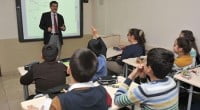Experts speak on role of digital media in society in İstanbul

Date posted: October 11, 2014
SEVGİ AKARÇEŞME / ISTANBUL
The Medialog Platform brought together academics and communication experts from different parts of the region surrounding Turkey in İstanbul on Friday for their second International Communication Conference, to discuss the impact of social media on politics and social movements.
Professor Nicolas Baygert from Belgium said the new forms of engagement emerging in social media are the biggest threat to the legitimacy of political leaders in today’s world. According to him, social media is a source of political self-determination. Baygert highlighted examples, such as the Pirate Party that emerged in Sweden in 2006, as a display of online political emancipation.
Medialog functions under the Journalists and Writers Foundation (GYV), which acts of the representative of the faith-based Hizmet movement in Turkey. Deputy Secretary General of Medialog Murat Akşit, said this conference should be useful at a time social media’s impact on social movements such as the Arab Spring are under the spotlight.
A participant from Ukraine, academic Bogdana Nosova, provided detailed examples from the massive and months-long protests in her country on the role of social media. She said people paid attention to the calls made on Facebook by journalists such as Mustafa Naim to meet in Maidan Square in Kiev. According to Nosova, the Internet is the most important factor in people maintaining their Ukrainian identity outside Ukraine.
For Professor Angeles Moreno from Spain, social media is currently the biggest challenge for conventional media. Similarly, Professor George Pelois from Greece said old media tools have lost their influence with the emergence of social media. He said that after Google, Facebook is the second most popular website that people visit in Greece.
German academic Hendrik Speck, who delivered a presentation on ethical issues in the communication sector, stated that there is no criteria for what is ethical on the Internet. Speck also directed attention to the generation gap between politicians in Europe and the countries’ Internet users.
Moderating one of the sessions, Professor Savaş Genç from İstanbul Fatih University touched upon the role of social media during the Gezi Park protests that shook the Turkey in the summer of 2013.
The Medialog conference hosted participants from the US, Russia, Hungary as well as Kazakhstan.
Source: Today's Zaman , October 10 2014
Tags: Hizmet and media | Journalists and Writers Foundation | Turkey |
























